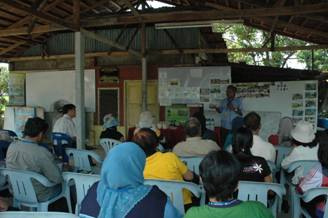Regional Workshop on Spread Prevention and Control of Apple Snail (Pomacea spp.) in Rice
|
|
|
|
|
Summary Biosecurity is a key requirement for achieving the goals set out in the FAO Strategic Framework by promoting, developing and re-enforcing policy and regulatory frameworks for food, agriculture, fisheries and forestry. Biosecurity encompasses all policy and regulatory frameworks to manage risks associated with food and agriculture, including relevant environmental risks. The apple snail (Pomacea spp.) has become a serious pest of rice in Asia and the Pacific region in the past few years. Extensive technical assistance to improve the capacity in effective management of this pest is needed. Prevention and reduction of risks of transboundary threats to food production, health and the environment is one of the focus areas of FAO, with its experience, expertise and knowledge to achieve results and impact on the ground. Participants and observers from seven countries attended this regional workshop on spread prevention and control of apple snail (Pomacea spp.) in rice. The workshop programme discussed the biology and ecology of the pest Pomacea spp. and control strategies. Participants shared their experiences and gained expertise in the field from the experts. The workshop presented the various methods to control Pomacea spp. i.e. physical control, cultural control, biological molluscicides, habitat modification, and chemical control. The workshop developed an action plan (including research, capacity building and an awareness progamme including communication and information exchange) and management strategies to mitigate infestation. The workshop also drafted national awareness programmes, control measures and collated reference materials related to Pomacea spp. in rice growing areas for APPPC member countries and Brunei Darussalam. Activities suggested in the awareness programme will be given priority and implemented immediately in each country. Participants are expected to become the core trainers and experts on apple snails in their own countries. In addition, they are to convey information to higher management levels to give more emphasis to apple snail activities, to prepare draft training materials and action plans for the control of apple snails in the region, and to review and update the reference materials.
|


